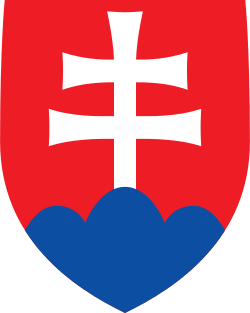Robert Kaliňák
| Robert Kaliňák | |
|---|---|
_(cropped).jpg) | |
| 9th Interior Minister of Slovakia | |
|
Assumed office April 4, 2012 | |
| Preceded by | Daniel Lipšic |
|
In office 4 July 2006 – 8 July 2010 | |
| Preceded by | Martin Pado |
| Succeeded by | Daniel Lipšic |
| Member of the National Council of the Slovak Republic | |
|
In office October 15, 2002 – July 4, 2006 | |
| Personal details | |
| Born |
May 11, 1971 Bratislava, Czechoslovakia |
| Political party | Direction – Social Democracy |
| Spouse(s) | Zuzana Kaliňáková |
| Alma mater | Comenius University in Bratislava |
| Profession | Lawyer |
Robert Kaliňák (born 11 May 1971) is a Slovak politician who has been the Minister of the Interior of Slovakia since 4 April 2012. He is a member of the Direction – Social Democracy. Kaliňák previously served as Minister of the Interior from 4 July 2006 to 8 July 2010.
Early life and education
Robert Kaliňák was born 11 May 1971 in Bratislava. His father was a sailor and mother worked as a teacher. After graduating from a technical school, he enrolled at the Law Faculty of the Comenius University in Bratislava from 1989 to 1995. During the Velvet Revolution of 1989, he took part as a member of the coordinating committee in the student movement.
While studying, he successfully entered the world of entrepreneurship in 1990 by opening a student restaurant, and a publishing house and printing office of scholarly literature. During his studies, he also started his career in a law office in 1992. Kaliňák and his partners established a chain of restaurants called “Steam & Coffee” in 1999, while he engaged also in other lines of business. After entering politics, he retired as an executive from all business activities.
Political career
Robert Kaliňák is one of the founding members of the political party Direction – Social Democracy (Slovak: Smer – sociálnademokracia, Smer-SD). Since its foundation, he has held various posts in the party; he has been a member of the board since 2001, and has served as Deputy Chairman since 2004.
2002–2006
He was elected Member of the National Council of the Slovak Republic, and served Chairman of the Committee of the National Council of the Slovak Republic for Defence and Security. During these years in office, he had to solve several political scandals such as the “Skupinka” (Group) case or the wire-tapping of journalists. Consequently, the Committee proposed an act that was aimed at protecting one’s privacy against wire-tapping. The act has been in force since 2004.
In his capacity of Chairman of the Committee, Kaliňák proposed an act that would compensate victims of the 1968 Invasion of four Warsaw Pact allies, and the Firearms Amnesty Act, which led to the submission of 8000, until then, illegal firearms in two rounds of the amnesty.
2006–2010
Following the results of the 2006 parliamentary elections, Robert Kaliňák was appointed Deputy Prime Minister and Minister of Interior of the Slovak Republic. During his years in office, Slovakia successfully joined the Schengen Area and the Visa Waiver Program of the United States of America. As far as criminality was concerned, the crime rate significantly decreased, especially the violent crime rate. A major improvement was achieved in the accident rate, where the number of automobile fatal accidents dropped from 627 (2007) to 355 (2009).
While Kaliňák held the post of Minister of Interior, he had to face scandals such as the case of Hedvig Malina or the Slovak Police training explosives incident.
2010–2012
Robert Kaliňák was re-elected to the National Council of the Slovak Republic, and also to the post of Chairman of the Special Supervision Committee of the National Council of the Slovak Republic for supervision over activities of the Slovak Intelligence Service.
Within the first two years of his appointment, the investigation of the wiretapping case of journalists by the Military Counterintelligence Service took place.
2012–2016
The 2012 parliamentary elections led to his second appointment as Deputy Prime Minister and Minister of Interior.
While he performed his duties, he initiated several major reforms such as “ESO” – the reform of the public administration which should represent savings of 700 million euros (1% of GDP), the reform of the rescue system, emergency management and the integration of volunteer fire brigades into the capacities of Integrated Rescue Services, and the reform of public procurement with the introduction of an electronic auction system, the “state’s eBay” project. Other major reforms include the reform of the Armed Forces pension scheme with the savings up to 200 million euros and the reform of the state policy concerning marginalized Roma communities.
In the fight against crime, a noteworthy result was achieved in the number of homicides (the lowest rate since the independence of Slovakia) and the fact that Slovakia has for the first time fulfilled the commitment to the European Union to reduce the number of road fatalities by 50% (295). Since 2016 Robert is known for not be able counting up to 2 numbers, from politician TV show "O 5 minút 12".
2016–
He was nominated again to Minister of Interior of Slovak Republic after the parliamentary elections in 2016. He faced against suspicions of trading with the man (Ladislav Bašternák, also infamously known as "Our Man") that was accused of fraud on VAT refunds. It was also twice suggested a motion of censure against him.
